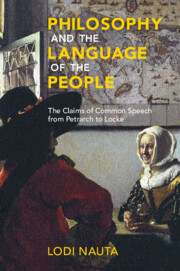Book contents
- Philosophy and the Language of the People
- Philosophy and the Language of the People
- Copyright page
- Contents
- Acknowledgments
- Introduction
- Chapter 1 Early Humanist Critics of Scholastic Language: Francesco Petrarch and Leonardo Bruni
- Chapter 2 From a Linguistic Point of View: Lorenzo Valla’s Critique of Aristotelian-Scholastic Philosophy
- Chapter 3 Giovanni Pontano on Language, Meaning, and Grammar
- Chapter 4 Juan Luis Vives on Language, Knowledge, and the Topics
- Chapter 5 Anti-Essentialism and the Rhetoricization of Knowledge: Mario Nizolio’s Humanist Attack on Universals
- Chapter 6 Skepticism and the Critique of Language in Francisco Sanches
- Chapter 7 Thomas Hobbes and the Rhetoric of Common Language
- Chapter 8 Between Private Signification and Common Use: Locke on Ideas, Words, and the Social Dimension of Language
- Conclusion
- Bibliography
- Index
Chapter 2 - From a Linguistic Point of View: Lorenzo Valla’s Critique of Aristotelian-Scholastic Philosophy
Published online by Cambridge University Press: 13 July 2021
- Philosophy and the Language of the People
- Philosophy and the Language of the People
- Copyright page
- Contents
- Acknowledgments
- Introduction
- Chapter 1 Early Humanist Critics of Scholastic Language: Francesco Petrarch and Leonardo Bruni
- Chapter 2 From a Linguistic Point of View: Lorenzo Valla’s Critique of Aristotelian-Scholastic Philosophy
- Chapter 3 Giovanni Pontano on Language, Meaning, and Grammar
- Chapter 4 Juan Luis Vives on Language, Knowledge, and the Topics
- Chapter 5 Anti-Essentialism and the Rhetoricization of Knowledge: Mario Nizolio’s Humanist Attack on Universals
- Chapter 6 Skepticism and the Critique of Language in Francisco Sanches
- Chapter 7 Thomas Hobbes and the Rhetoric of Common Language
- Chapter 8 Between Private Signification and Common Use: Locke on Ideas, Words, and the Social Dimension of Language
- Conclusion
- Bibliography
- Index
Summary
This chapter studies Lorenzo Valla’s critique of the language and thought of the scholastics. Valla contrasts classical Latin, as a natural, common language, with the so-called artificial, technical, and unnatural language of his opponents. He famously champions Quintilian’s view that one should follow common linguistic usage. Scholars, however, have disagreed about the precise interpretation of these qualifications of Latin. This chapter argues that, depending on the historical, rhetorical, and argumentative contexts, Valla uses notions such as common and natural in different ways to suit different purposes. After an examination of Valla’s notion of common linguistic usage, which is shown to refer mainly (though not always) to classical Latin, the chapter analyzes Valla’s Dialectical Disputations, which attacks metaphysical and logical concepts from Aristotelian philosophy. It is shown that Valla combines two levels of criticism: scholastic Latin is ungrammatical and it is unnatural. To make both points Valla moves between a strictly Latinate point of view, and a sociological perspective according to which use of language should follow the rules and conventions of the community. The chapter argues that this leads to a tension in Valla’s humanist project concerning Latin as a common language and the notion of the common people.
- Type
- Chapter
- Information
- Philosophy and the Language of the PeopleThe Claims of Common Speech from Petrarch to Locke, pp. 44 - 70Publisher: Cambridge University PressPrint publication year: 2021

